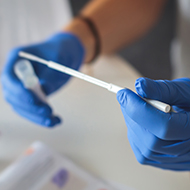Calls for compulsory testing after dog-to-human Brucella canis case confirmed

"The zoonotic risk is low but as this case demonstrates, very real" - Ian Wright, ESCCAP.
The UK's first case of dog-to-human transmission of Brucella canis (B canis) has been reported.
The bacteria causes an infectious disease called canine brucellosis, which in female dogs causes abortion in the first pregnancy following infection.
Other reproductive issues are commonly found with failure to conceive, abnormal semen quality, enlarged and painful testicles and epididymis. Non-specific symptoms for both sexes include lethargy, premature ageing, decreased appetite, weight loss and lameness.
German shepherd cross Moosha, a rescue dog imported from Belarus in March, was being fostered by a Stoke-on-Trent resident, Wendy Hayes.
Three days after Moosha arrived at Wendy's house, she began to abort her puppies. With this, Wendy was put on notice to stay home due to a fear of rabies, but Moosha was diagnosed with canine brucellosis two months later.
Ultimately, Wendy ended up contracting the disease and becoming hospitalised. Her four dogs were euthanised after three of them had contracted it, with the fourth at a high risk of becoming positive.
The UK's first known dog-to-human transmission of B canis, it is also the UK's first known dog-to-dog transmission of the disease.
Guideline director for the European Scientific Counsel Companion Animal Parasites (ESCCAP), Ian Wright, explained: “This is a tragic story and one we've feared happening in the UK as cases have been identified in imported dogs.
“The zoonotic risk is low but as this case demonstrates, very real. Ideally, testing should be compulsory for dogs being imported into the UK from endemic countries but until this happens, the most important thing that vets can do is recommend testing to owners of imported pets and charities.
“ESCCAP UK & Ireland is happy to discuss with charities what testing would be useful to implement.”
Mr Wright also outlined the clinical signs that veterinary professionals should know with regard to canine brucellosis: “Vets, nurses and owners should also be aware of relevant clinical signs in imported dogs including infertility, abortion, endometritis, epididymitis and orchitis and scrotal oedema.
“A wide range of non-reproductive conditions can also occur including chronic uveitis, endophthalmitis, discospondylitis, Lymphadenitis, lethargy, exercise intolerance, decreased appetite and weight loss.”



 The latest
The latest